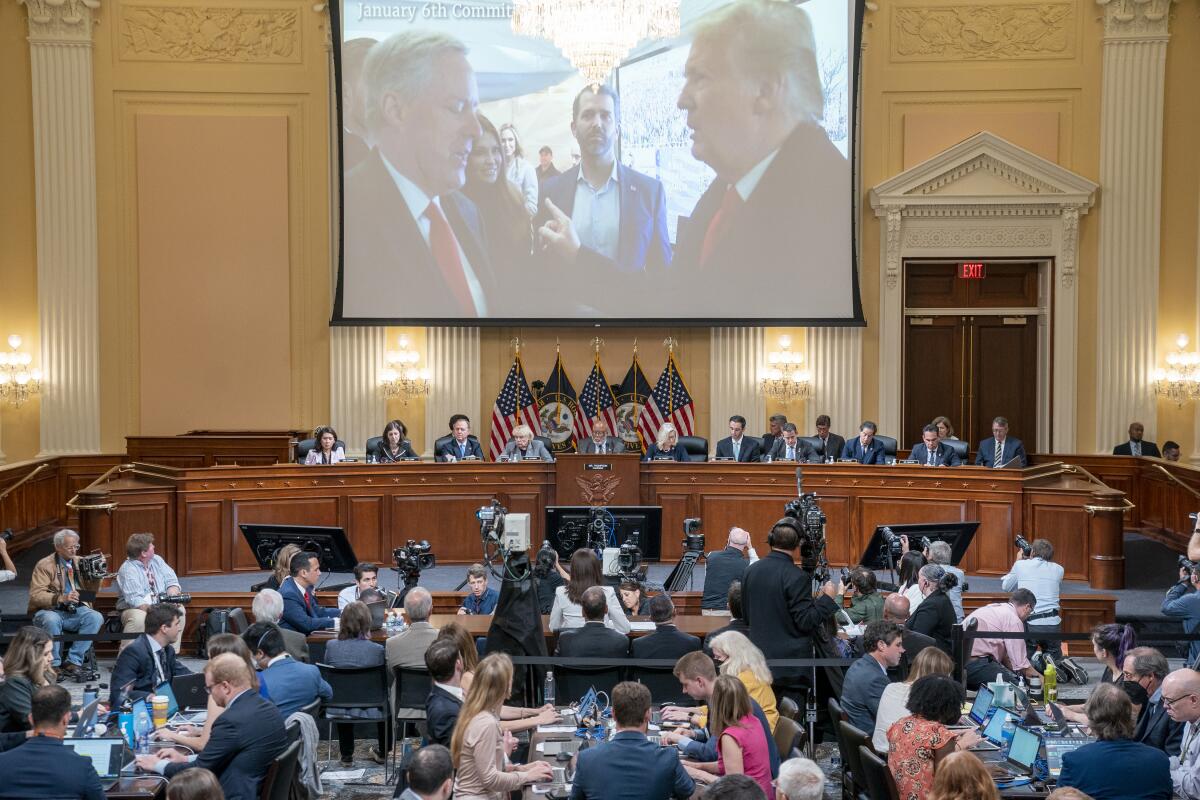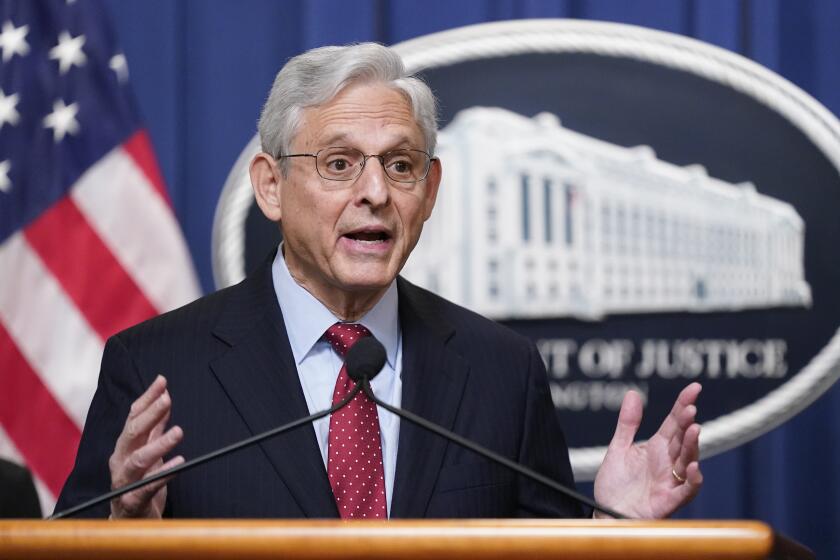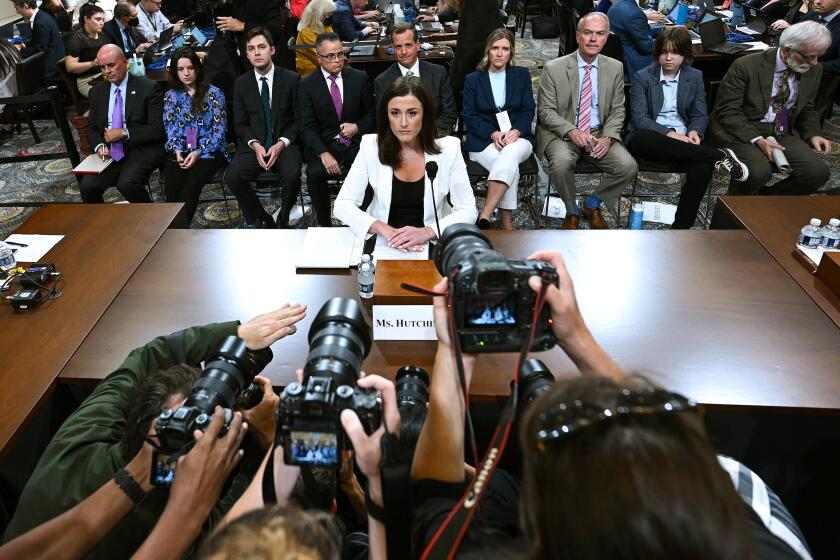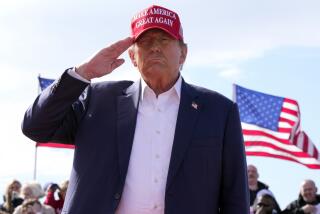Jan. 6 panel sets prime-time hearing to focus on Trump’s response to Capitol riot

WASHINGTON — The House committee investigating the Jan. 6 riot is returning to prime time with a Thursday evening hearing that will examine the three-hour-plus stretch when then-President Trump failed to act as a mob of supporters stormed the Capitol.
The committee is racing to gather newly emerging evidence and the session could be the final one in a series of public hearings that began in early June. A lawyer for former Trump strategist Stephen K. Bannon, who faces criminal charges after months of defying a congressional subpoena, told the committee over the weekend that Bannon may now be willing to testify, according to committee members.
“I expect that we will be hearing from him and there are many questions that we have for him,” said Rep. Zoe Lofgren (D-San Jose). She and other committee members said they wanted to hear from Bannon in a deposition, with sworn testimony.
Thursday’s hearing will be the first in a prime-time slot since the June 9 debut that was viewed by 20 million people. A hearing Tuesday will focus on the plotting and planning of the insurrection on Jan. 6, 2021, by white nationalist groups such as the Proud Boys, the Oath Keepers and the Three Percenters.
Convincing a jury that Trump is guilty beyond a reasonable doubt will be difficult.
Investigators are digging deeper into the mounds of evidence collected so far about the role extremist groups played in the deadly insurrection and what the former president was doing as the violence ensued down the street from the White House.
Rep. Adam Kinzinger (R-Ill.), who will lead Thursday’s hearing with Rep. Elaine Luria (D-Va.), described the upcoming testimony as key to providing an extensive timeline of what Trump did and did not do in those crucial hours on the afternoon of Jan. 6, 2021. That includes Trump’s tweet criticizing Vice President Mike Pence for lacking “courage” as angry protesters outside the Capitol were heard chanting “Hang Mike Pence” for not challenging Democrat Joe Biden’s 2020 election victory.
“We want to show the American people what was the president doing during that time,” Kinzinger said Sunday. “The rest of the country knew that there was an insurrection. The president obviously had to have known there was an insurrection. So where was he? What was he doing? It’s a very important hearing. Pay attention. Because I think it goes to the heart of what is the oath of a leader.”
News of the hearing comes as Congress returns to Washington after a two-week recess. Lawmakers on the committee had indicated in mid-June there would be no more hearings until July, but in late June they held a surprise hearing for the testimony of former Trump White House aide Cassidy Hutchinson.
Cassidy Hutchinson revealed that White House officials knew about the risk of violence on Jan. 6 in the days prior to the insurrection.
Her explosive testimony provided the most compelling evidence yet that Trump could be linked to a federal crime. Since then, the committee of seven Democrats and two Republicans has seen an influx of new information and confidential tips.
Tuesday’s hearing will explore efforts to assemble the mob on the National Mall and then organize the march down Pennsylvania Avenue, where some rioters — armed with pipes, bats and bear spray — charged into the Capitol, quickly overrunning the overwhelmed police force. More than 100 police officers were injured, many beaten, bloodied and bruised.
Lawmakers also plan on examining the financing of the various rallies and gatherings around Washington that were planned that day.
Bannon’s apparent turnabout in testifying comes as he faces a criminal trial this month on two counts of contempt of Congress for defying the committee’s subpoena. He has argued that his testimony is protected by Trump’s claim of executive privilege, a claim the committee has countered is dubious because Trump had fired Bannon from the White House in 2017, and Bannon was thus a private citizen when he was consulting with Trump in the run-up to the riot.
In recent days, as the former president has grown frustrated with what he has decried as a one-sided presentation by the committee, Trump said he would waive that privilege claim, according to a letter Saturday to Bannon’s lawyer.
“If you reach an agreement on a time and place for your testimony, I will waive executive privilege for you, which allows for you to go in and testify truthfully and fairly, as per the request of the unselect committee of political thugs and hacks,” Trump wrote.
It remains unclear how much Bannon actually intends to cooperate. He has expressed a preference to appear before the committee in a public hearing. The committee is making clear he must first sit for a private interview, typically in a sworn deposition. It’s also possible he may opt to appear and then refuse to answer questions, citing his 5th Amendment right against self-incrimination.
The committee has said there is evidence that Bannon “had specific knowledge about the events planned for Jan. 6 before they occurred.” It cited as an example comments that he made on his podcast the day before the riot.
“It’s not going to happen like you think it’s going to happen. OK, it’s going to be quite extraordinarily different. All I can say is strap in,” Bannon said in that podcast. “All hell is going to break loose tomorrow. ... So many people said, ‘Man, if I was in a revolution, I would be in Washington.’ Well, this is your time in history.”
Kinzinger spoke on ABC’s “This Week” and Lofgren was on CNN’s “State of the Union.”
More to Read
Get the L.A. Times Politics newsletter
Deeply reported insights into legislation, politics and policy from Sacramento, Washington and beyond. In your inbox three times per week.
You may occasionally receive promotional content from the Los Angeles Times.












